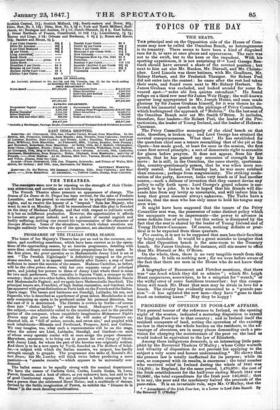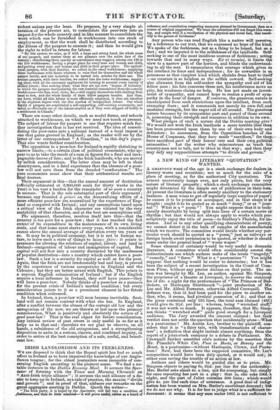PROGRESS OF OPINION IN POOR-LAW AFFAIRS. THE general tenour of
the references to Ireland, on the opening night of the session, indicated a maturing disposition to extend the English Poor-law to that country ; and in Ireland itself the resident occupants of land, noting the operation of the existing no-law in throwing the whole burden on the residents, to the ad- vantage of absentees, are in many places demanding such a pro, vision for charging the maintenance of the poor on the land 48 would indeed be equivalent to the law of Elizabeth. Among these indigenous demands, is an interesting little pam- phlet by the Reverend Thadeus O'Malley ; whose Celtic warmth and vivacity of disposition do not prevent his applying to the subject a very acute and honest understanding.* He shows that the present law is totally ineffectual for its purpose; while its cost, as compared with its results, is enormous : the total number who received relief in Ireland during the whole of 1845 was 114,205; in England, for the same period, 1,470,970: the cost of the Irish establishment for the half-year ending March 1844 was 70,9061., the total expenditure for the Irish poor 146,385!.; that is to say, the poor and the machinery halved the proceeds of the poor-rates. It is an invariable rule, says Mr. O'Malley, that the • "Amendment of the Irish Poor-law, in a Letter to Lord John Russell By the Reverend T. tYMAUey." richest unions pay the least. He proposes, by a very simple al- teration of the present act, to consolidate the poor-rate into an impost for the whole country., and in like manner to consolidate the work which can be furnished in workhouses into one stock of employment, so that the work shall be distributed according to the fitness of the paupers to execute it ; and then he would give the right to relief in return for labour. - " By this system we seize, as if with a large and strong hand, the whole mass af our paupers, and scatter them at our pleasure over the entire face of the country; distributing them exactly as convenience may suggest, among our 180 or our 250 workhouses; having a proper place for everyman and woman and child, undputting every man and woman and child in their proper place. The agricul- tural panpers, with their families, we collect in the rural workhouses; supplying these workhouses with farms whereon to raise food for themselves and the whole pauper family, and raw materials to be turned into articles for their use. The artisan paupers, with their families, we collect into the town workhouses; supply- ing them with all the necessary appliances for turning to account every variety of elled labour; thus making them, what they are not now, houses of industry,' in which the paupers manipulating the raw material transmitted from the country workhouses—the flax, wool, skins, &c.—will supply themselves with clothing from head to foot, and the whole family of their fellow paupers besides. And thus, my Lord, whilst all this labour is most efficiently employed, it does not interfere in the slightest degree with the free market of independent labour. Our whole family of paupers are constituted a self-supporting, self-existing community, and taken as effectually out of the labour-market as if they were shipped off bodily to a settlement in Canada."
There are some other details, such as model farms, and schools attached to workhouses, on which we need not touch at present. The subject of labour for paupers is one that requires much fur- ther investigation than is has yet received. The idea of consoli- dating the poor-rates into a national instead of a local impost is one that gains ground in England ; as the reader will see by the letter of our correspondent "A Guardian," in this day's paper. That also wants further consideration.
The opposition to a poor-law for Ireland is rapidly shrinking to narrow limits,—to a certain class of political economists, who ap- pear to us to take the result of a sum in figures for a final and inex- pugnable decree of fate; and to the Irish landlords, who are moved by selfish considerations. The latter class may be left to their countrymen, and to a fatal experience that the absence of a poor- law will not save them from the dreaded "confiscation." The pure economists must show that their arithmetical results are final decrees.
Their argument is this—that the annual amount of destitution (officially estimated at 2,300,000 souls for thirty weeks in the year) is too vast a burden for the remainder of so poor a country to assume. 1 That is the sole substantial part of their argument ; because any founded a priori on the demoralizing effects of a more efficient poor-law are neutralized by the experience of Eng- land as compared with Ireland ; and any assumptions based upon a critical view of the Irish character are vitiated by the very mutability of that character, and at the best are assumptions still.
The argument, therefore, resolves itself into this—that the t ountry is too poor for a poor-law ; that it has reached the full extent of its expenditure in the maintenance of its own living binds, and that some must starve every year, with a considerable excess above the annual average of starvation every ten years or SO. It may be in political economy, but it is not in human na- ture, to leave such a state of things to laissez faire: it points to measures for altering the relations of capital, labour, and land in Ireland—emigration of labour and immigration of capital. But capital will not flow into a country distracted by the madnesses of popular destitution—into a country which cannot have a poor- law. Such a law is a security for capital as well as for the poor. Again, that the Irish are not irredeemably bad and lazy, is proved by the experience of various occupations in England and the Colonies ; but they are better mixed with English. This points to a copious English colonization of Ireland : but if the English acquire a local influence in Ireland, they will have peace—they will have a poor-law. Nobody thinks of a poor-law as a panacea fur the present crisis of Ireland's morbid condition ; but every Consideration points to it as a prominent element in her future condition when redeemed.
In Ireland, then, a poor-law will soon become inevitable. Scot- land will not remain content with what she has. In England, aft& a conflict between the abuses of the corrupt old law and the antagonism of the new, we are thrown at last upon the primary consideration, What is positively and absolutely the nature of a good poor-law ? That is the real object for future consideration. Any critical review of past errors is only useful in so far as it helps us to that end : therefore we are glad to observe, on all hands, a subsidence of the old antagonism, and a strengthening disposition to unite in a serious, sincere, and combined inquiry, in order to arrive at the best conception of a safe, useful, and benefi- cent law.



























 Previous page
Previous page